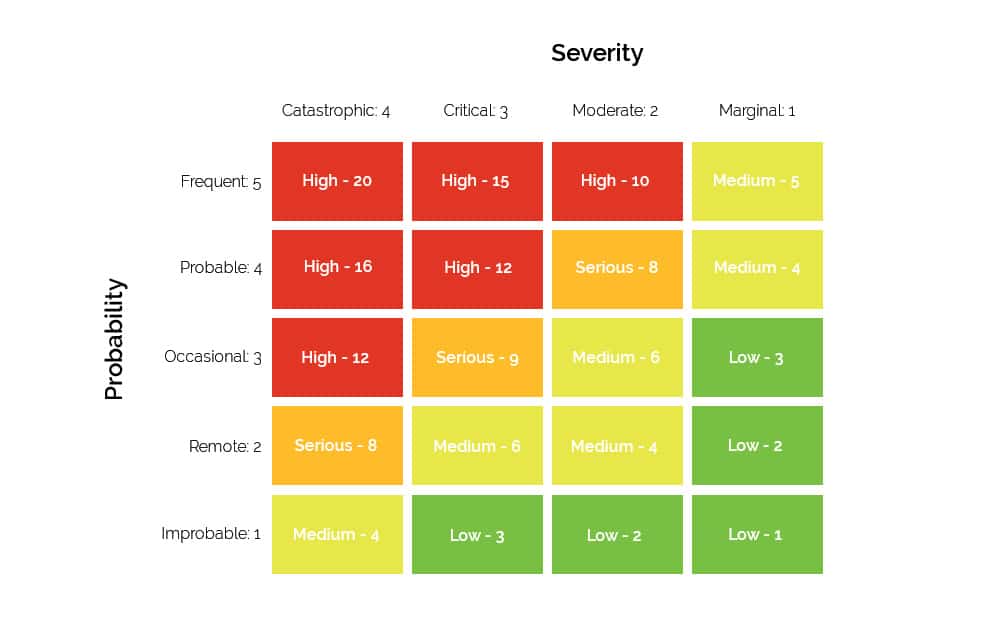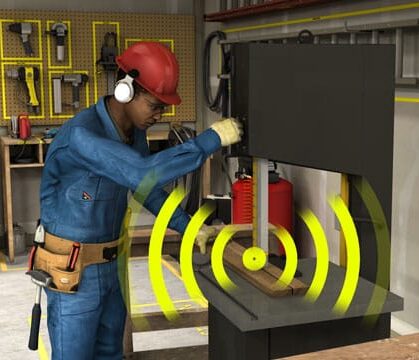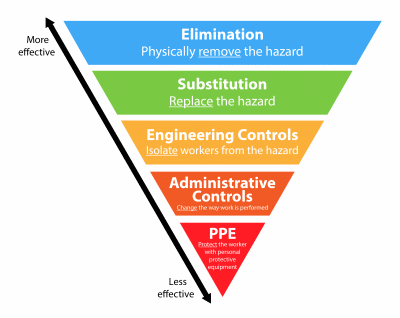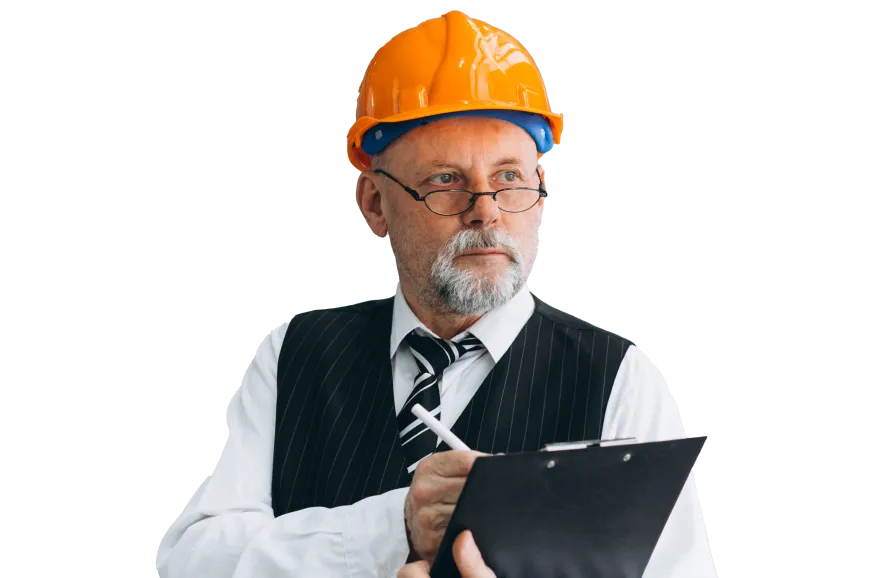March 11, 2024 9 min read
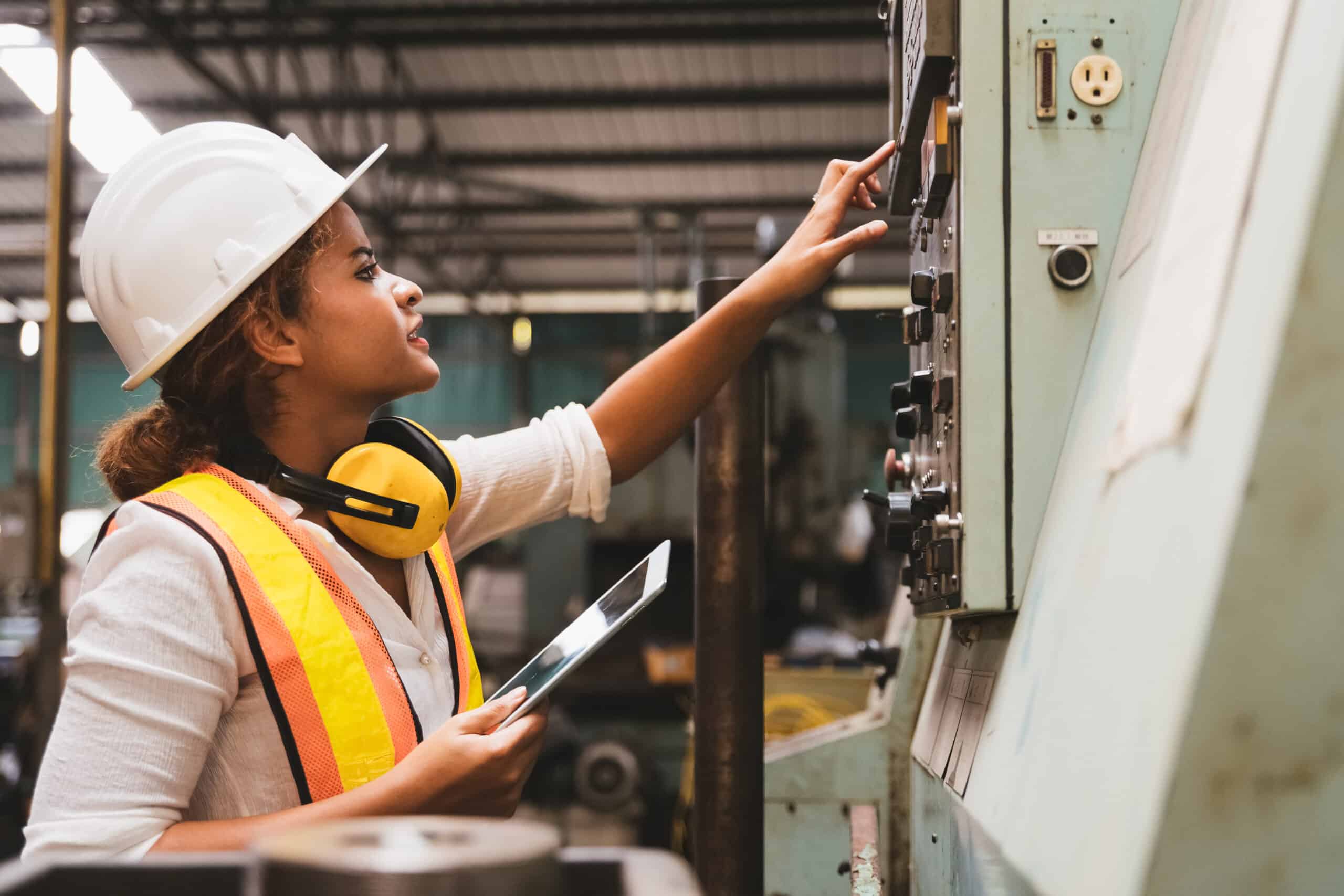
What Is Facilities Maintenance?
Industry:
Solution:

Facilities maintenance is an essential part of our economy, supporting numerous other industries from manufacturing to healthcare. But if you’re wondering what facility maintenance is, what role it plays in key industries, and how to find the right solutions to support your essential workforce, we’ve got you covered. In this blog, we’ll delve into the intricacies of this profession.
What is Facilities Maintenance?
Facilities maintenance is the proactive management and upkeep of the physical assets and infrastructure of a built environment. This includes the installation, inspection, routine maintenance, and repair of machines and equipment.
This critical profession encompasses a variety of tasks all aimed at ensuring the optimal functionality, safety, and efficiency of buildings, equipment, and surrounding spaces.
The scope of facilities maintenance work is vast, including:
- Commercial buildings
- Manufacturing facilities
- Educational institutions
- Healthcare centers
- Data centers
- And more
In each industry, there are unique needs that facility maintenance teams need to account for.
Key Definitions
Facilities maintenance is the umbrella term for this profession. But there are nuances depending on the industry:
Industrial Maintenance: Maintenance of manufacturing, commercial facilities
Property Maintenance: Maintenance of residential buildings
The Power of Online Maintenance Training Guide
Uncover the impacts on hiring, skills development, performance and productivity.
View Guide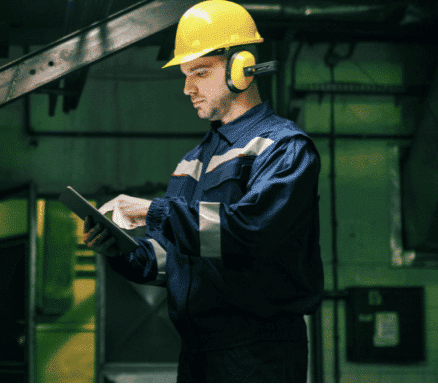
Is Facilities Management the Same as Maintenance?
There’s a common misconception about the terms “facilities management” and “maintenance” being interchangeable. Although they are closely related, they represent distinct facets within the broader scope of facility operations.
- Facilities management encompasses a more comprehensive approach, including strategic planning, space utilization, workforce management and training, and holistic facility operations.
- Facilities maintenance specifically focuses on the routine upkeep, repairs, and preservation of physical assets.
Understanding this distinction is crucial for organizations seeking to establish effective facility strategies.
A Learning Path for New and Current FM Employees
This user-friendly learning path template takes the guesswork out of designing your training program by providing pre-selected courses from Vector’s extensive training catalog, Facilities Management, and Maintenance Library.
Download Template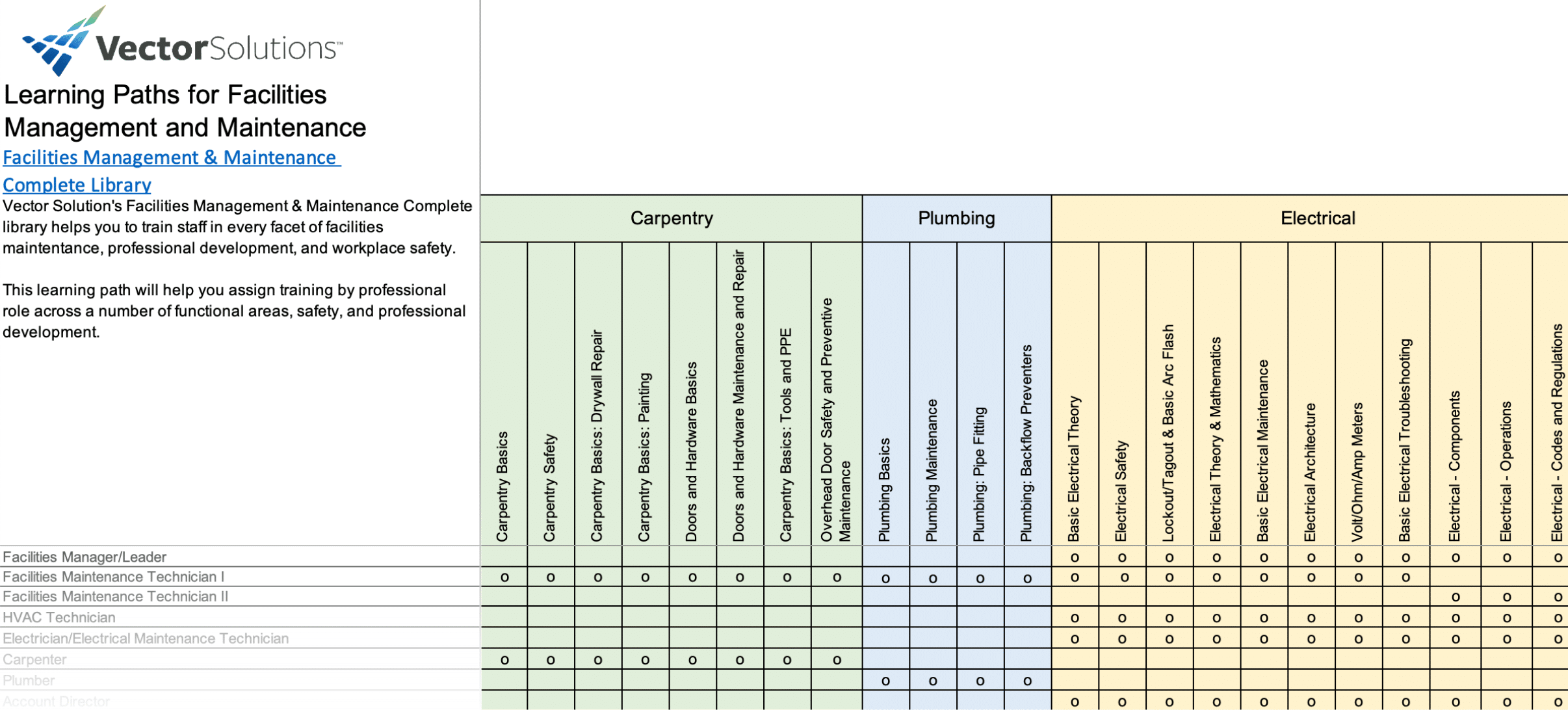
What is the Main Goal of Facility Maintenance?
The primary goal of facility maintenance is to guarantee the functionality and longevity of physical assets within a facility.
Achieving this involves a proactive approach to address potential issues before they escalate, ensuring that equipment, infrastructure, and systems operate at peak efficiency. By conducting routine inspections, implementing preventive measures, and swiftly addressing repairs, the main objective is to minimize downtime, reduce operational costs, and create a safe and optimal environment for occupants.
In essence, the main goal of facility maintenance is to contribute to the overall success and productivity of an organization by preserving the integrity of its physical assets.
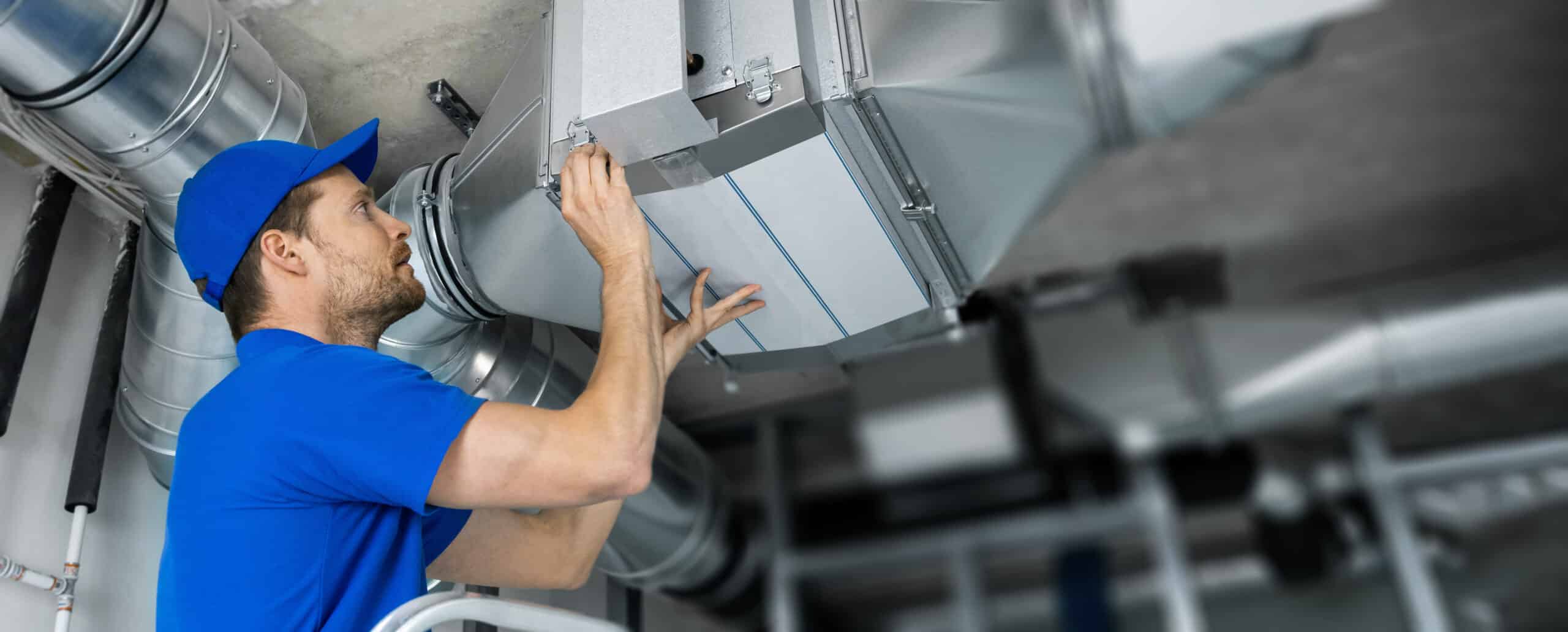
Emerging Trends in Facilities Maintenance
Predictive maintenance
Predictive maintenance has gained prominence in facilities management as organizations seek proactive strategies to optimize operational efficiency and asset reliability. By analyzing historical data and real-time performance metrics, facilities can predict equipment failures and schedule maintenance before issues arise.
This approach helps minimize downtime, extend asset lifespan, and reduce maintenance costs. Embracing predictive maintenance not only enhances overall operational efficiency but also ensures continuity in facility operations.
Wellness and Employee Health
There has been a growing emphasis on wellness and employee health within facilities maintenance. Organizations are increasingly recognizing the importance of health and safety to enhance workforce efficiency and employee wellbeing. According to The State of Industrial Worker Safety and Wellbeing Report, 30 percent of workers state that poorly maintained equipment is outdated and leaves the door open for safety incidents.
By fostering a healthier work environment and ensuring that safety protocols are rigorously followed, companies can reduce the risk of injuries and illnesses, thereby improving overall productivity. This focus on employee well-being not only helps in maintaining a more engaged and motivated workforce but also contributes to the longevity and reliability of facility operations.
Environmental Sustainability in Facilities
Environmental sustainability is becoming a critical aspect of facilities maintenance. As more organizations strive to meet green building standards, the focus on sustainable practices has intensified. This includes the adoption of energy-efficient systems, waste reduction strategies, and the use of eco-friendly materials.
Moreover, ensuring infrastructure resilience against environmental challenges is now a key priority. Facility resiliency planning is essential to prepare for and mitigate the impacts of climate change and other environmental factors. By integrating sustainable practices, facilities can reduce their environmental footprint while maintaining operational efficiency and infrastructure resilience.
The Role of Facility Managers and Facility Maintenance Technicians
Facility Managers and Maintenance Technicians have integral roles within the facilities management industry.
Facility Managers
Facility managers oversee and coordinate all aspects of facility operations. Their role involves:
- Strategic Planning. Developing and implementing long-term plans to align facility resources with organizational objectives.
- Budgeting. Managing financial resources for maintenance, repairs, and facility improvements.
- Space Utilization. Optimizing the use of available space for efficiency and functionality.
- Vendor Management. Collaborating with external service providers for specialized maintenance tasks.
- Regulatory Compliance. Ensuring their facility adheres to safety, health, and environmental regulations and OSHA.
Facility Maintenance Technicians
Facility Maintenance Technicians are deskless workers responsible for the hands-on tasks involved in maintaining and repairing physical assets. Their expertise spans various trades, allowing them to address a diverse range of maintenance needs (e.g., HVAC, electrical, plumbing, etc.). Their role involves:
- Routine Inspections. Conducting regular assessments to identify potential issues and areas in need of maintenance.
- Repairs. Addressing equipment malfunctions, structural issues, and other maintenance requirements promptly.
- Preventive Maintenance. Implementing scheduled maintenance tasks to prevent breakdowns and prolong the lifespan of assets.
- Documentation. Keeping detailed records of maintenance activities, inspections, and repairs.

Advanced Training Programs for Technicians
Advanced training programs for facility maintenance technicians are essential for keeping pace with evolving industry demands and technological advancements. These programs delve deeper into specialized areas such as advanced HVAC systems, energy-efficient technologies, and sustainable practices.
Technicians gain proficiency in handling complex maintenance tasks, troubleshooting sophisticated equipment, and implementing cutting-edge solutions to enhance operational efficiency. Continuing education through advanced training equips technicians with the skills needed to perform at the highest level, ensuring they can effectively maintain and optimize facility assets for long-term reliability and performance.
Important Facilities Maintenance Training Topics
Facilities maintenance technicians require training on a variety of topics. This includes knowing how to inspect, service, and repair:
- Electrical systems
- Cooling systems
- Heating systems
- HVAC
- Hydronic systems
- Plumbing
- Water treatment
- Refrigeration
- Fire systems and sprinklers
But other important topics include:
- Building Automation
- Energy Management
- Emergency Power
- Work order management
- Preventative maintenance
Industrial Facility Management and Maintenance Training Library
Vector Solutions’ online industrial facilities training can help your workforce reduce risks, close skill gaps, reduce operations and maintenance costs, all while increasing safety and productivity.
View Library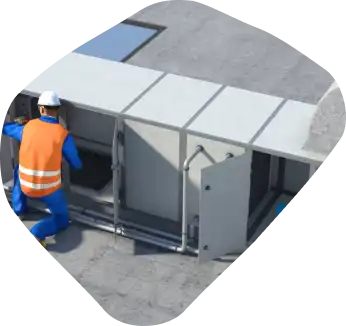
Certification and Professional Development
Certification and ongoing professional development are crucial for facilities maintenance professionals to stay current with industry standards and advancements. Certifications such as HVAC technician certification, electrical maintenance certification, and plumbing certifications validate expertise in specialized areas.
For facility managers, achieving the Certified Facility Manager (CFM) certification from the International Facility Management Association (IFMA) demonstrates comprehensive knowledge and proficiency in facility management practices. Continuous professional development through workshops, seminars, and online courses ensures that maintenance technicians and facility managers alike are equipped with the latest skills and knowledge in emerging technologies and best practices. Investing in certification and professional development enhances individual career prospects and contributes to the efficiency and effectiveness of facility maintenance operations.
Choosing the Right Facility Maintenance Solutions
Selecting the appropriate facility maintenance solutions is critical to ensure the efficacy and success of your maintenance programs. Technology plays a pivotal role in enhancing training, streamlining operations, and ensuring compliance with safety standards.
Training Management
Learning Management Systems (LMS) help with organizing, delivering, and tracking training initiatives. These systems provide a centralized platform for managing training programs, ensuring that employees receive the right training at the right time. Key features include:
- Course Management. Efficiently organize and assign training courses to personnel.
- User Tracking. Monitor and record employee progress, ensuring compliance with training requirements and identifying areas for continued improvement.
- Scheduling and Notifications. Facilitate seamless scheduling of training sessions and send timely notifications to participants. Administrators should also be able to receive notifications when training deadlines are approaching to ensure employees stay in compliance and maintain any professional licenses.
- Reporting and Analytics. Generate detailed reports on training effectiveness, completion rates, and overall program performance.
eLearning Content
Incorporating eLearning into facility maintenance training brings flexibility and accessibility to education initiatives. eLearning content can be more engaging and enables employees to learn at their own pace. Key features of effective online training include:
- Multimedia Content. Deliver training content through multimedia formats, including videos and Competency Assessments.
- Accessibility. Provide 24/7 access to training materials, accommodating diverse schedules and remote learning. Bonus points if the content is also translated into multiple languages to accommodate a diverse workforce.
EHS Management Solutions
Environment, Health, and Safety (EHS) Management Solutions are integral for maintaining a secure and compliant facility. These solutions not only mitigate risks but also contribute to the overall well-being of employees and the environment. Key features of effective EHS Management Solutions include:
- Incident Reporting. Streamline the reporting of workplace incidents, near misses, and hazards.
- Compliance Management. Ensure adherence to safety regulations and industry standards.
- Audit and Inspection Tools. Conduct regular audits and inspections to identify potential hazards and ensure compliance.
Making Informed Decisions
Choosing the right Facilities Management and Maintenance solutions involves a meticulous assessment of your organization’s needs, considering factors such as the size of your workforce, specific training requirements, and regulatory compliance. By leveraging the right technology, organizations can enhance the skills of their maintenance teams and foster a culture of safety, efficiency, and continuous improvement.
Interested in learning more about Vector Solutions’ training and safety management solutions? Request a demo today to see them in action.




